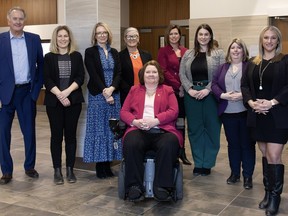
A candid conversation was promised and delivered on Wednesday at the City of Brantford’s first Women in Governance event.
Advertisement 2
Article content
Brantford councilors Rose Sicoli, Linda Hunt and Mandy Samwell were joined by other female panelists for some straight talk about the challenges women face in politics. The session was moderated by Jan Vilaca, owner of Tasty Road Trips Inc.
Article content
Sicoli said when she moved to Brantford in 2008 she didn’t see herself reflected in a municipal council dominated largely by older men.
“I didn’t see a lot of women or millennials,” said Sicoli, who was appointed to fill a Ward 1 vacancy in 2021 and elected to the position the following year. “I thought the conversation might go a little bit differently if I was on there – and I think it has.”
Hunt, who had decades of volunteer experience before she ran for her council seat in 2022, said the time commitment required to be a municipal councilor was a concern.
Advertisement 3
Article content
“I have two full-time businesses I’m still running and was well aware (the job) was not just showing up on Tuesday nights for a council meeting.”
Panelist Diana Huson became the first woman to both run for and hold the position of regional councilor in the Town of Pelham in 2018, when there were four women on Niagara Regional Council and 32 men.
“There’s still a lot of room for firsts,” said Huson. “We think we’ve come so far but we actually haven’t come that far at all.”
A report from the Federation of Canadian Municipalities indicates about 31 per cent of elected officials are women, but that percentage is much lower in some smaller municipalities.
Panelist Natasha Salonen, who was elected in 2022 as the first female mayor of the Township of Wilmot and, at age 27, the youngest female mayor in Ontario history, said women may be apprehensive about entering politics because of the lack of support they get.
Advertisement 4
Article content
Salonen said debate about hiring support staff for the mayor and councilors in Wilmot, a municipality of 22,000, was a “really awkward conversation.”
“People said other councils didn’t have support staff,” she said. “That’s because they were all men who had wives at home making supper.”
Sicoli said “we have to stop the narrative as women that we can take on everything when we haven’t taught men to take on more.”
Huson said it’s important to see women in leadership roles, “but we have to be really careful” about voicing the negative aspects of politics. She said being a advisor has expanded her professional growth and knowledge.
“It’s a fantastic job,” said Huson.
Panelist Erin O’Hoski is the deputy chief administrative officer for the City of St. Catharines, overseeing city departments with a combined annual operating budget of $118 million and an asset portfolio of $7.2 billion.
Advertisement 5
Article content
O’Hoski said in addition to women, more focus needs to be put on ensuring more diversity in leadership roles that includes those from different backgrounds, physical abilities and sexual orientation.
Also on the panel was Emily McIntosh who initiated, in 2022, The Women of Ontario Say No, a non-partisan advocacy group lobbying the government to pass legislation that would hold municipal councilors accountable for violence and harassment. Currently, councilors can only lose their seats when they break election spending rules and certain conflict of interest policies. The most severe penalty is suspension of pay. McIntosh said that deters victims, particularly women, from coming forward.
“We have to speak out,” said McIntosh, adding that more than 200 municipalities have formally endorsed their call. “If we don’t, it’s never going to change.”
Samwell, who was elected to Brantford council in 2022, said not everyone wants to be in politics but women can make change by being a vote.
“It’s the power you have to balance the council table.”
Article content